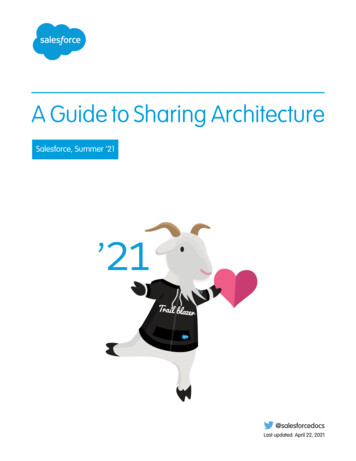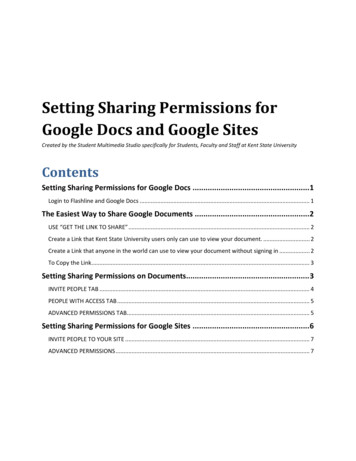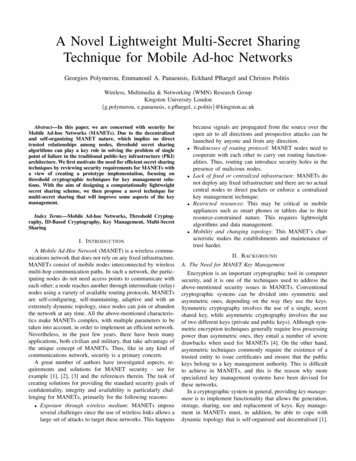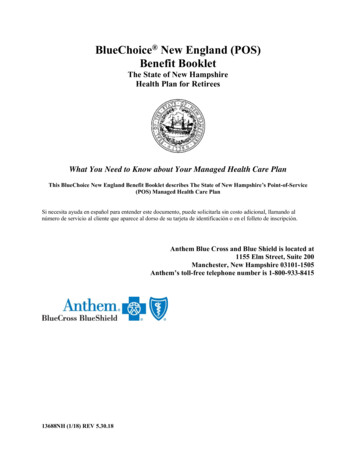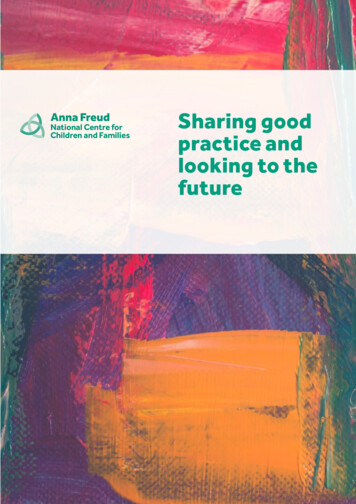
Transcription
Sharing goodpractice andlooking to thefuture
Sharing good practice and looking to the futureThroughout the disruption of the past three months, schools andcolleges have responded speedily, sensitively and creatively to thedemands placed on them by the impact of the coronavirus pandemic.As well as having to rethink how education is delivered, settings havehad to consider the psychological impacts of lockdown and how it hasaffected their pupils’ wellbeing.In this booklet we include someexamples of good practice thatschools have shared with usabout how they’ve responded tothe challenges of lockdown. Wealso look at how this period oflockdown can help us think aboutwhole-school approaches tomental health and include somesuggestions about how to startthis process.how some schools have responded to supportpupils during this time. These interventions andstrategies can also be adapted to help managechange and disruption in other circumstances.Practice examplesThe following case studies are examples of practicethat schools sent to us to highlight how theyresponded to these needs.During lockdown we have been collectingexamples of good practice from our Schoolsin Mind Network. These case studies illustrateOur case studies emerged from a survey we sharedthrough our Schools in Mind network at the end ofMarch 2020 to identity schools main concerns. Wereceived 307 responses and used them to developresources for schools that would be the mostrelevant and useful.Our respondents were most worried about beingable to support their most vulnerable pupils,particularly where pupils had less structure androutine in their home lives and no longer had dailyaccess to teaching staff.1.Lessness Heath Primary school: communication is keyLessness Heath Primary school, in the London Borough of Bexley, focused on buildingsustainable relationships with vulnerable children and their families.‘Our first step was to reach out to our families and collect circumstantial data aroundthe risks and lived experiences of our pupils and parents. This information was readilyavailable to us as we have a rigorous wellbeing auditing process to ascertain needs.Every day, high quality home learning was sent home. Our families are really gratefulfor the personal effort that each teacher has put in to meet individual needs. Parentshave received weekly check in calls and doorstop visits to establish the wellbeing of ourfamilies. Our partnership of work and continued sense of togetherness has been builton trust, this is deep routed within our positive school culture.’Kelly Hannaghan, Wellbeing Consultant, Lessness Heath Primary School,Bexleyheath2.Blessed Hugh Faringdon Secondary: identify hidden issuesStaff at Blessed Hugh Faringdon Catholic School, a secondary school in Reading,identified ‘hidden’ issues that could emerge as a result of pupils not attending school.‘A principle concern is in identifying the ‘hidden’ issues such as those students for whomwe had no previous concerns but whose mental health and well-being are suffering,and those who find themselves adversely affected by the mental health problems orthe impact of the actions of a member of their household. Being proactive, remainingabreast of developments, communicating information promptly and clearly along withan ongoing dialogue are fundamental to our effectiveness in the current fast changing,unpredictable environment in which we find ourselves.’Sue Matthews, Assistant Headteacher and Designated Safeguarding Lead, BlessedHugh Faringdon Catholic School, Reading2Anna Freud National Centre for Children and FamiliesAnna Freud National Centre for Children and Families3
Sharing good practice and looking to the future3.Gordon Primary School, Greenwich: creating a sense ofbelonging.The school has used classroom bubbles as a way of creating a sense of belonging. Theschool has also incorporated social distancing into its end of year activities:‘All the bubbles in school have chosen an animal for their bubble class identity makinga sense of belonging. Some of them have made their own socially distanced friendlygreeting gestures.The year sixes are working on a socially distanced end of year production! This shouldstill be able to provide the children with some sort of ending memory and togetherness.’Lotti Newlove, Learning Mentor, Gordon Primary School, Greenwich4.Cherbourg Primary School: working together across the wholeschool communityAs schools begin to welcome back larger groups of pupils, a key concern for staff andfamilies is how social distancing measures are implemented in school. CherbourgPrimary School in Southampton invited pupils to be part of the decision-making aroundnew safety measures. Involving pupils in problem solving helps to build resilience andcreates a sense of unity which can have a positive impact on wellbeing during thischallenging time.‘The children were asked to write down their ideas to reduce touching and keep cleanacross a number of aspects of normal school life. Their solutions have been invaluableas our plans for the next twelve months evolve. Ideas included: The use of individual bum bags to carry personal pens, pencils etc A worry monster in each class A class hygiene monitor Doors propped open where possible Staggered start and end to the day New groupings with names (e.g. watermelons and coconuts) which indicate whoto line up with, where, what toilet to use and what side of classroom bubblethey’re on.’Julie Greer, Headteacher, Cherbourg Primary School, Eastleigh5.Gordon Primary School,GreenwichAlliance for Learning: promoting mental health and wellbeing‘Mental health and wellbeing of our children and young people and their carers hasbeen a key focus and we are signposting key resources including those from the AnnaFreud Centre, via a Covid-19 section on our website, social media and other regularcommunications. We are also hosting introductory sessions to mental health and a freeMental Health First Aid refresher course for staff within our school network Across ourschools we have been encouraging schools to share approaches so that no school isstruggling alone.’Lisa Fathers, Director of Teaching School and Partnerships, Alliance for Learning,North West England4Anna Freud National Centre for Children and FamiliesAnna Freud National Centre for Children and Families5
Sharing good practice and looking to the futureAdditional resourcesLooking to the future:Managing the transition back toschool, Anna Freud Centre.Many lessons about how to support pupils’ mental health willhave emerged from lockdown. But how can they be applied tofuture policies and practice in our settings?Whole-school approachesWe know that whole-school approachesto mental health and wellbeing can havesignificant impact on children and young people.Such approaches take time, leadership andcommitment, and are best managed gradually.Research shows social and emotionalprogrammes can reduce conduct problemsby around 11% and can have importantconsequences for both the individual and thebroader school environment. The impact is evengreater for ‘at risk’ children and young people(for example, those with mental health problems)while the limited research available also suggeststhat children from socio-economically deprivedand ethnic minority backgrounds typicallyexperience greater improvements than theirpeers.For schools and colleges wishing to adopt awhole-school approach, it may be helpful toreview what has been learnt from lockdown. Agood starting point would be to look at workingwith stakeholders.Children and young people can learn aboutresilience when they see that challenges canbe overcome by working with others. Duringlockdown, schools and colleges will have forgednew relationships with parents and carersto support children and young people. Thistogetherness is crucial to the recovery processand can help children and young people feel thatthey don’t have to face challenges alone.You could capture learning by asking some simplequestions, such as: 6Emerging Evidence: Coronavirus andchildren and young people’s mentalhealth Vol. 1, the Evidence BasedPractice Unit, a partnership of theAnna Freud Centre and UCL.You could use a format with three questions and acomment box: Emerging Evidence: Coronavirus andchildren and young people’s mentalhealth Vol. 2, the Evidence BasedPractice Unit, a partnership of theAnna Freud Centre and UCL.What did we do well?What could we have done better?What would we do differently next time?Any other comments?Coronavirus toolkit 7: managingtransitions, Mentally Healthy Schools,Anna Freud Centre.All of the main stakeholder groups – pupils,parents and carers, staff and relevantorganisations should be involved in the feedbackprocess.Ten steps towards school staffwellbeing, Anna Freud Centre.Don’t forget your achievementsThe incredible successes of schools duringlockdown has been achieved through the energyand commitment of staff. There can be no bettertime to pay respect to their work by developing orreviewing approaches to staff mental health andwellbeing to sustain the workforce now and intothe future.As schools return to some semblance ofnormality, it is important to reflect on what hasbeen achieved during this period. With no notice,entire ways of working have been re-thoughtand new ways of reaching out to pupils havebeen developed. What schools have achieved isnothing short of amazing, and acknowledging thisto staff and pupils, as well as to the wider schoolcommunity, at a time which has undoubtedly beendifficult and stressful for all concerned is the bestway to start the recovery programme. There is somuch to look back on and to be proud of and it isimportant to communicate this to all those whocontributed.More about Schools in MindSchools in Mind is a free network forstaff working in schools and colleges,and allied professionals which sharespractical, academic and clinicalexpertise regarding the wellbeing andmental health issues that affect schools.Join us hereFinding supportSamaritans: 116 123 / samaritans.orgChildline: 0800 1111 / childline.org.ukYouth Wellbeing Directory:youthwellbeing.co.ukDetails on how to find urgent help areavailable here: www.annafreud.org/onmy-mind/urgent-help/How did we support our pupils?How did we support families?How did we support staff?How did we work with other agencies?Anna Freud National Centre for Children and FamiliesAnna Freud National Centre for Children and Families7
About usThe Anna Freud National Centre for Children and Families hasdeveloped and delivered pioneering mental health care for over 65years. Our aim is to transform current mental health provision in the UKby improving the quality, accessibility and effectiveness of treatment.We believe that every child and their family should be at the heart ofthe care they receive, working in partnership with professionals.Our Patron: Her Royal Highness The Duchess of CambridgeThe Anna Freud Centre, operating as Anna Freud National Centre for Children andFamilies, is a registered charity, number 1077106, and company limited by guarantee,company number 03819888.Registered addressAnna Freud Centre4-8 Rodney StreetLondonN1 9JHT 44 (0)20 7794 2313E info@annafreud.org
the challenges of lockdown. We also look at how this period of lockdown can help us think about whole-school approaches to mental health and include some suggestions about how to start this process. During lockdown we have been collecting examples of good practice from our Schools in Mind Network. These case studies illustrate

